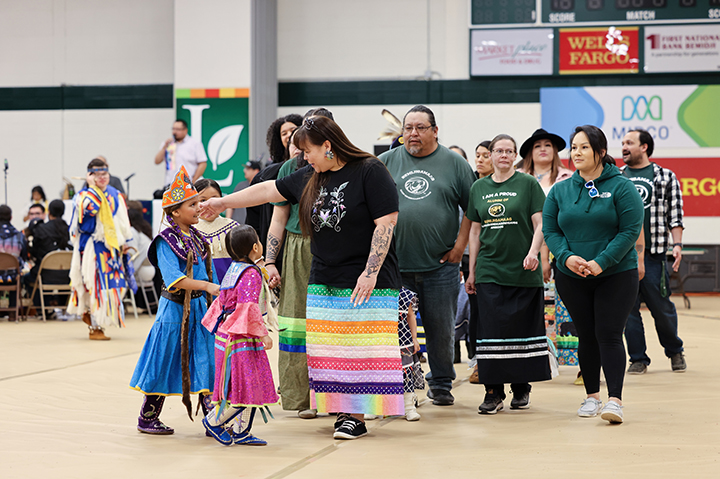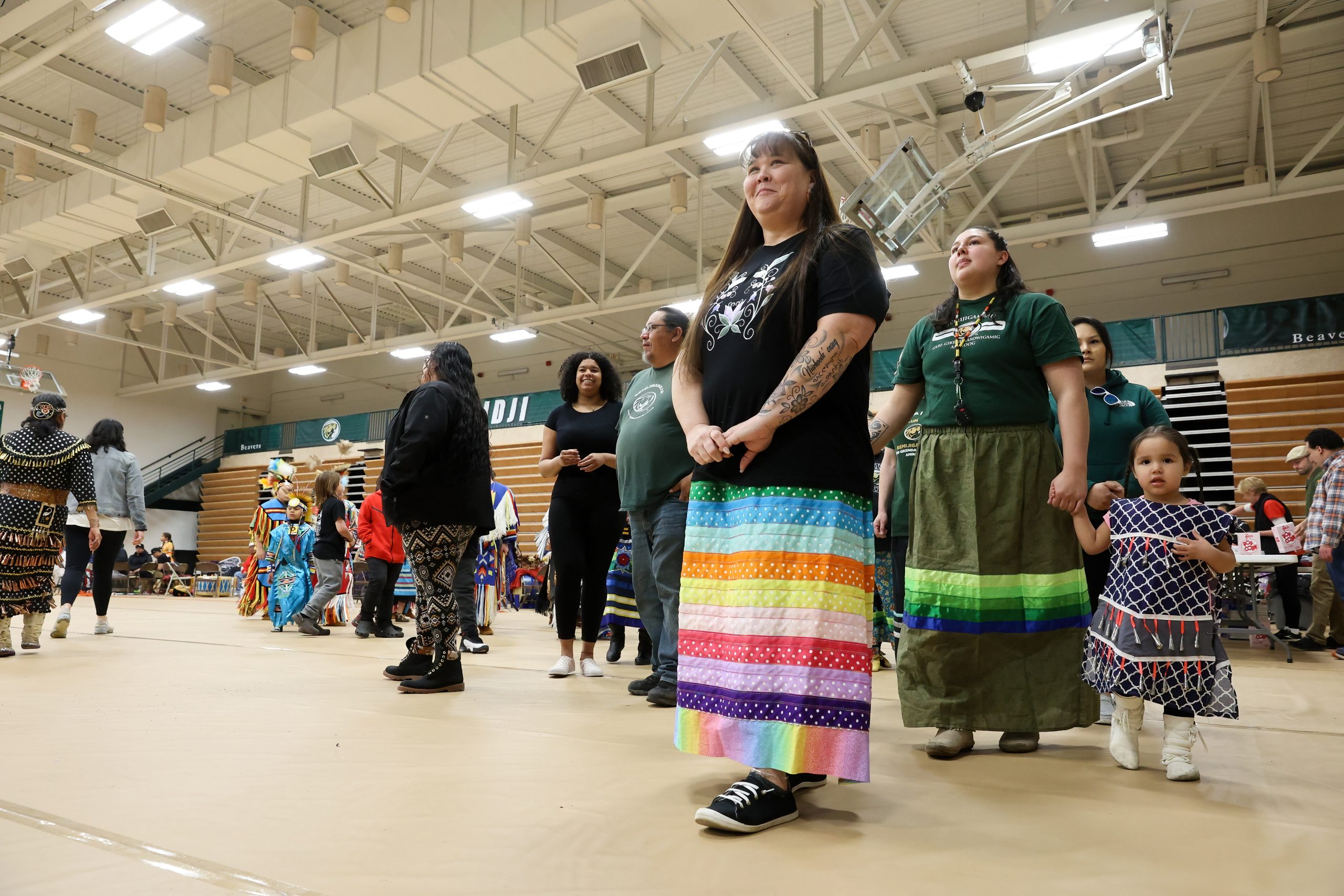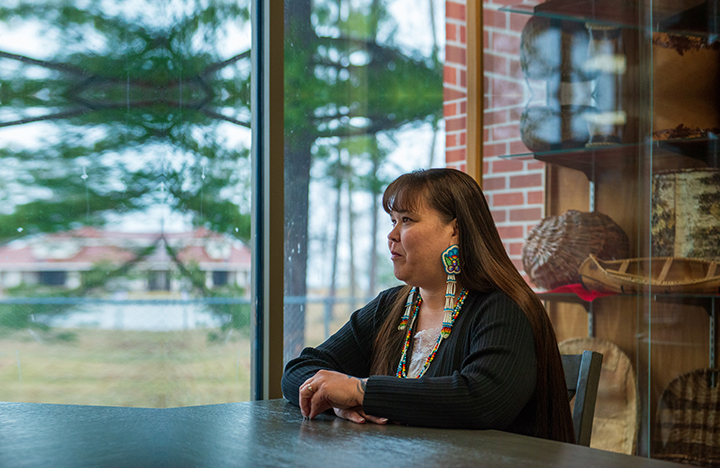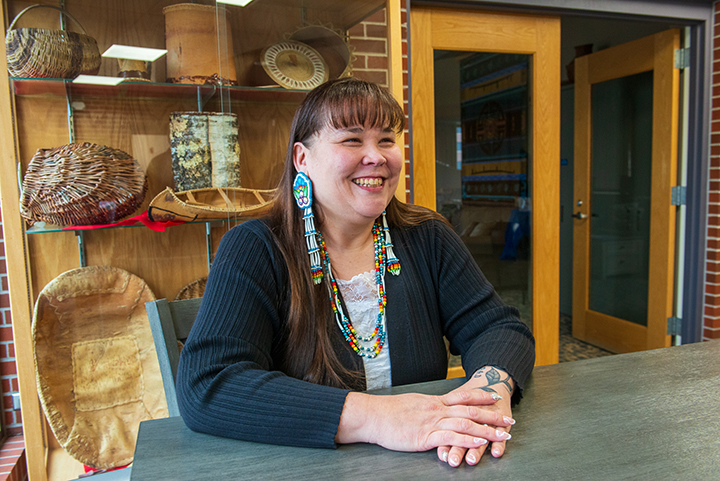
Bemidji State University's 50th annual Powwow
Chrissy Downwind, a champion for student success at Bemidji State University and Northwest Technical College through her work at the American Indian Resource Center, reflects on her BSU experience, her tireless support of education for Bemidji’s American Indian community and the personal legacy of equity she is advancing after being promoted to a ground-breaking administrator position at BSU and NTC.
She wouldn’t realize it until much later, but Chrissy Downwind’s motivation to help Bemidji State University and Northwest Technical College students overcome barriers and reach their education goals can likely be attributed to her trailblazing father.
Downwind’s father moved his family from the Twin Cities metro to attend St. Cloud State University and pursue his dream of becoming the first in his family to earn a degree. Graduating in 1988 with degrees in psychology and social work, he soon accepted a position with the university and in the early 90s helped establish the university’s American Indian Center and American Indian studies program before health issues forced him to retire early.
Watching her father earn his degree, advocate for opportunities and create resources for St. Cloud State’s American Indian students left a profound impact on Downwind, sparking a very similar journey of advocacy at her own alma mater.
Downwind, who identifies as Ojibwe and Lakota, arrived at Bemidji State in 1998 looking to create a better future for her young family. She quickly found support and mentorship from fellow American Indian students and faculty and staff at the Indian Studies Center, located in the basement of the now-demolished Sanford Hall. Serving as the secretary treasurer for BSU’s Council of Indian Students, she helped plan the university’s annual powwow — held for the 50th time on April 29, 2023, making it one of the longest- running powwows in the region — and coordinated fundraisers and other events for the council. She graduated from BSU in 2002 with a bachelor’s degree in Indian studies with a minor in Ojibwe language.
She was also an instrumental part of the committee that advocated for the American Indian Resource Center to be built on the BSU campus in 2003. A legislative appropriation and gifts from foundations, tribal governments, individuals and other groups helped the university finally provide a stand-alone space specifically for teaching the culture, history and lifeways of Indigenous peoples and guiding American Indian students over obstacles that might otherwise hamper their success on campus.
Downwind spent 15 years in a variety of American Indian student-advocacy roles in northern Minnesota K-12 schools before being returning to campus in 2019 as the AIRC’s outreach specialist, working to bring American Indian student groups for campus tours, guide prospective students through the application process and build relationships with BSU’s tribal college partners at Red Lake Nation College, White Earth Tribal and Community College, Leech Lake Tribal College and Fond Du Lac Tribal and Community College.

After being named the AIRC’s executive director in 2020, Downwind has worked alongside a team of educators, student support staff, event planners and outreach specialists to grow BSU into a destination university for the region’s American Indian students. BSU and NTC enrolled a record 455 American Indian students during the 2022-23 academic year.
In a historic move, Downwind was elevated to serve both BSU and NTC as vice president for American Indian student success & campus diversity officer on April 24, 2023. She becomes the first American Indian woman to hold a vice president position at a four-year university campus in the Minnesota State system of colleges and universities.
President Dr. John L. Hoffman said Downwind is uniquely qualified to lead the institutions’ missions to ensure that student success and retention extend to all students, regardless of their ethnic, cultural or socio-economic backgrounds.
“Her passion to serve underrepresented students is clear in everything she does. In this moment of our history, Chrissy will provide bold leadership that draws from Ojibwe culture and values to advance our cornerstone values of advancing holistic student learning and success for all students through initiatives rooted in diversity, equity and inclusion.”
Downwind, as vice president, will collaborate with professionals across campus to further BSU and NTC’s equity, diversity and inclusion initiatives related to the recruitment, development and retention of students and employees from minoritized backgrounds. Her new role is an important part of both institutions’ ongoing commitment to providing equitable educational opportunities to all students, especially low-income, first- generation, LGBTQIA+, American Indian and students of color.
“BSU and NTC have taken big steps toward righting some of the wrongs made toward the American Indian community by educating on the truths behind the history of our place,” Downwind said about the responsibilities of her new appointment. “We need to all come together to best serve our students and give them the best experience possible while they are at our institutions.”
A Mutual Understanding

Downwind’s promotion coincides with Bemidji State’s recent unveiling its Nisidotaading program and becoming one of the nation’s first universities to require all students to take an Indigenous-focused course in order to graduate.
Pronounced “nis-ee-do-tah-ding,” the Ojibwe phrase means “having a mutual understanding.”
President Hoffman said the program’s name was chosen to reflect BSU’s unparalleled capacity to develop understanding of issues facing Indigenous people in Northern Minnesota and beyond.
“This program provides our students, staff and faculty with a unique and powerful educational opportunity,” he said. “The land we occupy is Indian homeland and the Ojibwe and Dakota people are its original stewards.
“At its core, higher education is about the pursuit of knowledge and understanding so our graduates can create a better world. Nisidotaading will help ensure that our students are creating that world with an understanding of the rich, shared history found in the lands, communities and people that our institution encompasses.”
BSU is located amidst the state’s three largest Indigenous nations — the Leech Lake Nation, the Red Lake Nation and the White Earth Nation. Its campus sits on treaty land.
According to 2021 U.S. Census Bureau data, people with Indigenous lineage make up between 10-20 percent of the city of Bemidji’s population of 15,279 and more than 10 percent of a 170,000 regional population. University faculty and staff who have been working to develop Nisidotaading for more than a year say the goal is to ensure that BSU students across all disciplines graduate with an opportunity to develop an understanding of Indigenous peoples and cultures and the issues they face — the idea encompassed in the program’s name.
“We want to tell our students that no matter where you go after graduating, you’ll live and work alongside American Indian people,” Downwind said. “Our goal is to give all students a general understanding of the history and what it means to be an American Indian person.”
Which specific courses will be part of the Nisidotaading program are still being identified, but in general they will feature analyses of the histories, cultures, languages, ways of knowing or contemporary realities of the Indigenous people of North America. Courses could include those offered through Bemidji State’s languages and Indigenous studies department or discipline-specific courses which have been designed with a specific Indigenous focus.
The Nisidotaading program is thought to be unique amongst American higher education institutions. Similar, but not identical, requirements exist in the Alaska university system and at Metropolitan State University in St. Paul. Canada’s University of Winnipeg also has a similar requirement.
Leading Through Doing

Bemidji State again reaffirmed its commitment to serving Indigenous students by being named home to the Minnesota State system of colleges and universities’ new Institute for Indigenous Education and Practice. The institute was announced in commemoration of Indigenous Peoples’ Day at an Oct. 10, 2022, gathering of over 100 BSU students, faculty and staff in Beaux Arts Ballroom on the BSU campus.
In her new vice president role, Downwind will provide leadership for the institute. Funded by the Minnesota State system of colleges and universities, the institute will serve as a regional hub for creating and distributing professional development, training and curriculum-development resources to all Minnesota State faculty and staff. These resources will bolster campus- specific action plans meant to support Indigenous students across Minnesota State’s 33 member campuses.
President Hoffman said the university plans to seek additional grant funding from the state of Minnesota and other sources to build upon its current capacity to serve Minnesota State students, faculty and staff long-term.
“This reflects a long heritage of work by our American Indian faculty, students and staff at this institution,” he said. “It has not been easy work, but has come with great accomplishments and joy realized in the lives of our students.”
Dovetailing naturally with the creation of the Nisidotaading program, a portion of Minnesota State’s initial funding is earmarked to educate, mentor and support BSU faculty as they welcome students back into their classrooms beginning fall 2024 and work to carry out the goals of the Indigenous course requirement.
“We will offer professional development support for our campus that will culminate in the creation of two communities of practice for faculty and staff on our campus,” President Hoffman said.
The practices identified initially at BSU that best further the institute’s mission will be shared with fellow Minnesota State institutions to help better educate their campus communities on the historical trauma and lived experiences of Indigenous populations and how to most effectively guide Indigenous students toward their education goals.
Focused on providing equitable education opportunities for Indigenous students and reinforcing BSU and Minnesota State’s shared commitment to equity, diversity and inclusion, the Institute for Indigenous Education and Practice is closely modeled after eight unique centers of excellence housed at Minnesota State campuses across the state. These centers focus on enhancing education opportunities for and inspiring students in the agricultural, energy production, engineering, manufacturing, healthcare, information technology and transportation fields.
Continuing a Legacy
BSU is home to the first collegiate Ojibwe language program and one of the first Indian studies programs in Minnesota. Its Indian Studies Center, the predecessor to today’s American Indian Resource Center, offered a space on campus for American Indian students to find community with other students, faculty and staff as far back as the early 1970s.
Today, BSU offers students several degree programs and many courses that focus on Indigenous people, communities and issues. The Council of Indian Students is a vibrant student organization on campus. BSU is the first institution in the Minnesota State system to offer an equity certificate program. The Nisidotaading program and new Institute for Indigenous Education & Practice are newsworthy equity initiatives not only at BSU and the Minnesota State system, but at colleges and universities nationwide.
Despite this, Downwind is quick to acknowledge that BSU and NTC have not always carried through with its promise to protect and support Native American and other minoritized students from injustice on campus. There have certainly been missteps, but her historic appointment as vice president for American Indian student success & campus diversity officer builds upon the institutions’ reenergized commitment to supporting their underrepresented students.
Thirty years later, her father’s work to promote cultural understanding and equity continues to ignite Downwind’s passion for serving students.
“I feel as though I’m continuing his legacy in my new role here at BSU and NTC,” Downwind said.
By Eric Sorenson
